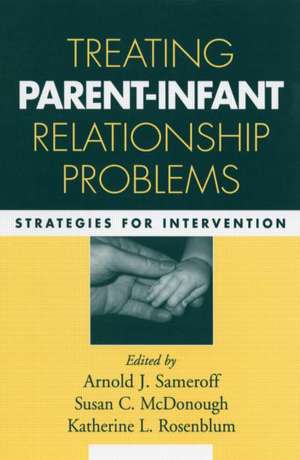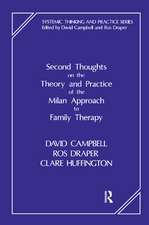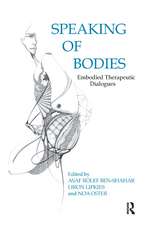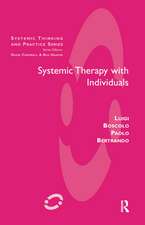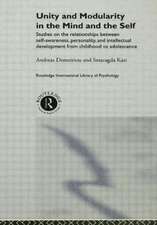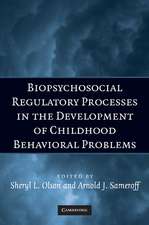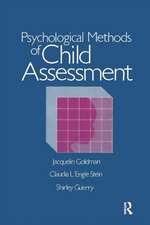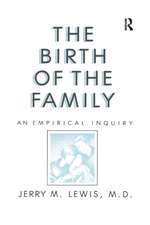Treating Parent-Infant Relationship Problems: Strategies for Intervention
Editat de Arnold J. Sameroff, Susan C. McDonough, Katherine L. Rosenblumen Limba Engleză Paperback – 18 aug 2005
Within a developmental framework, this book guides the clinician to understand the different types of problems that parents have with infants and to determine how a given family might best be served--whether by addressing health concerns that are affecting infant behavior, modifying parental beliefs or expectations, or improving key caregiving skills. Leading interdisciplinary experts detail their respective therapeutic models in a practical, clinician-friendly format, including intervention guidelines and illustrative case material. Special topics covered include working with families of infants with special needs and with those at risk for child maltreatment.
| Toate formatele și edițiile | Preț | Express |
|---|---|---|
| Paperback (1) | 257.28 lei 6-8 săpt. | +23.47 lei 7-11 zile |
| Guilford Publications – 18 aug 2005 | 257.28 lei 6-8 săpt. | +23.47 lei 7-11 zile |
| Hardback (1) | 570.36 lei 6-8 săpt. | |
| Guilford Publications – 15 apr 2004 | 570.36 lei 6-8 săpt. |
Preț: 257.28 lei
Preț vechi: 270.83 lei
-5% Nou
Puncte Express: 386
Preț estimativ în valută:
49.24€ • 53.46$ • 41.36£
49.24€ • 53.46$ • 41.36£
Carte tipărită la comandă
Livrare economică 22 aprilie-06 mai
Livrare express 18-22 martie pentru 33.46 lei
Preluare comenzi: 021 569.72.76
Specificații
ISBN-13: 9781593852450
ISBN-10: 1593852452
Pagini: 304
Dimensiuni: 152 x 229 x 21 mm
Greutate: 0.44 kg
Ediția:1
Editura: Guilford Publications
Colecția Guilford Press
ISBN-10: 1593852452
Pagini: 304
Dimensiuni: 152 x 229 x 21 mm
Greutate: 0.44 kg
Ediția:1
Editura: Guilford Publications
Colecția Guilford Press
Public țintă
Professional Practice & DevelopmentCuprins
I. Themes
1. Ports of Entry and the Dynamics of Mother-Infant Interventions, Arnold J. Sameroff
2. The Motherhood Constellation: Therapeutic Approaches to Early Relational Problems, Daniel N. Stern
3. Defining Infant Mental Health: A Developmental Relational Perspective on Assessment and Diagnosis, Katherine L. Rosenblum
II. Variations
4. Interaction Guidance: Promoting and Nurturing the Caregiving Relationship, Susan C. McDonough
5. Child-Parent Psychotherapy: A Relationship-Based Approach to the Treatment of Mental Health Disorders in Infancy and Early Childhood, Alicia F. Lieberman
6. The Primary Triangle: Treating Infants in Their Families, Elisabeth Fivaz-Depeursinge, Antoinette Corboz-Warnery, and Miri Keren
7. A Sensory Processing Approach to Supporting Infant-Caregiver Relationships, Winnie Dunn
8. A Multifocal Neonatal Intervention, Nadia Bruschweiler-Stern
9. Lessons from STEEP: Linking Theory, Research, and Practice for the Well-Being of Infants and Parents, Byron Egeland and Martha Farrell Erickson
10. Treating Parent-Infant Relationships in the Context of Maltreatment: An Integrated Systems Approach, Julie A. Larrieu and Charles H. Zeanah
III. Coda
11. Therapeutic Relationships in Infant Mental Health and the Concept of Leverage, Robert N. Emde, Kevin D. Everhart, and Brian K. Wise
1. Ports of Entry and the Dynamics of Mother-Infant Interventions, Arnold J. Sameroff
2. The Motherhood Constellation: Therapeutic Approaches to Early Relational Problems, Daniel N. Stern
3. Defining Infant Mental Health: A Developmental Relational Perspective on Assessment and Diagnosis, Katherine L. Rosenblum
II. Variations
4. Interaction Guidance: Promoting and Nurturing the Caregiving Relationship, Susan C. McDonough
5. Child-Parent Psychotherapy: A Relationship-Based Approach to the Treatment of Mental Health Disorders in Infancy and Early Childhood, Alicia F. Lieberman
6. The Primary Triangle: Treating Infants in Their Families, Elisabeth Fivaz-Depeursinge, Antoinette Corboz-Warnery, and Miri Keren
7. A Sensory Processing Approach to Supporting Infant-Caregiver Relationships, Winnie Dunn
8. A Multifocal Neonatal Intervention, Nadia Bruschweiler-Stern
9. Lessons from STEEP: Linking Theory, Research, and Practice for the Well-Being of Infants and Parents, Byron Egeland and Martha Farrell Erickson
10. Treating Parent-Infant Relationships in the Context of Maltreatment: An Integrated Systems Approach, Julie A. Larrieu and Charles H. Zeanah
III. Coda
11. Therapeutic Relationships in Infant Mental Health and the Concept of Leverage, Robert N. Emde, Kevin D. Everhart, and Brian K. Wise
Notă biografică
Arnold J. Sameroff, PhD, is a developmental psychologist who specializes in infant mental health. He is a professor in the Department of Psychology at the University of Michigan, where he is also Director of the Center for Development and Mental Health at the Center for Human Growth and Development. Dr. Sameroff's theoretical and empirical writings have been a foundation for the field of developmental psychopathology. After serving as president of the International Society on Infant Studies, he is now president-elect of the Society for Research in Child Development.
Susan C. McDonough, PhD, MSW, is a social worker who specializes in treating relationship problems of parents and infants with special needs. She is an associate research scientist in the School of Social Work and the Center for Human Growth and Development at the University of Michigan. Dr. McDonough directs the University of Michigan Post-Graduate Certificate Training Program in Clinical Work with Infants, Toddlers and Their Families, and is an international consultant for infant and family mental health programs.
Katherine L. Rosenblum, PhD, is a clinical and developmental psychologist who specializes in research on parents' representations of their infants and on infant emotional development. She is an assistant research investigator at the Center for Human Growth and Development at the University of Michigan. Dr. Rosenblum has taught the clinical applications of attachment research to multidisciplinary groups at the University of Michigan and the University of Vienna.
Susan C. McDonough, PhD, MSW, is a social worker who specializes in treating relationship problems of parents and infants with special needs. She is an associate research scientist in the School of Social Work and the Center for Human Growth and Development at the University of Michigan. Dr. McDonough directs the University of Michigan Post-Graduate Certificate Training Program in Clinical Work with Infants, Toddlers and Their Families, and is an international consultant for infant and family mental health programs.
Katherine L. Rosenblum, PhD, is a clinical and developmental psychologist who specializes in research on parents' representations of their infants and on infant emotional development. She is an assistant research investigator at the Center for Human Growth and Development at the University of Michigan. Dr. Rosenblum has taught the clinical applications of attachment research to multidisciplinary groups at the University of Michigan and the University of Vienna.
Recenzii
This is an important and thought-provoking book that carries the field of infant mental health to a new level of synthesis and discovery. The research and practice described in this volume will help students, practitioners, and researchers recognize the challenges inherent in relationship-based activities, integrate the various strands that form the theoretical framework of infant-parent mental health practice, and explore novel methodologies and approaches that will enhance the lives of caregivers and their infants.--Samuel J. Meisels, EdD, President, Erikson Institute
This volume provides state-of-the-science knowledge for working with parents and infants. Experienced professionals as well as novices will find the book uniquely useful, whether they define their work as early intervention, infant mental health, or developmental care. The authors are all experts in dealing with relationship issues, and bring their evolving theoretical and clinical thinking to the chapters. Sameroff et al. have produced an ideal text for infancy-related graduate courses in psychology, social work, nursing, psychiatry, education, and occupational and physical therapy.--Kathryn E. Barnard RN, PhD, Center on Infant Mental Health and Development, University of Washington School of Nursing
This is a landmark volume that forcefully reminds the field that relationships are the key to successful therapy and intervention. Both the early pioneers and the more recent innovators of this approach are well represented in this exciting and forward-looking collection. The inclusion of contributions from diverse fields makes this volume useful for a wide range of practitioners and scholars, including social workers, occupational therapists, pediatricians, psychiatrists, and psychologists. It should be required reading for developmentally and clinically oriented graduate students.--Ross D. Parke, PhD, Center for Family Studies, University of California, Riverside; past president, Society for Research in Child Development
This long-overdue book meets a compelling need. The gap between what we know about early relationship problems and what we do to help parents and their young children is unacceptably wide. This book offers a wealth of knowledge that can help us narrow that gap. The editors have done a masterful job in bringing together a virtual ‘who's who’ in early childhood mental health, and in making their combined wisdom accessible to advanced students and practitioners.--Jack P. Shonkoff, MD, Heller School for Social Policy and Management, Brandeis University
This is the first integration of therapeutic approaches to problematic parent-infant relationships, and I am sure it will be the best for many years to come. The book is a definitive guide to techniques of prevention and intervention, and it is exemplary in its combination of readability and clinical sophistication. An absolute gem of a collection, this book is essential reading not only for those psychotherapists working with parents and infants, but also for the many others whose technique is influenced by contemporary understandings of early relationships.--Peter Fonagy, PhD, Psychoanalysis Unit, University College London, UK
-This volume provides state-of-the-science knowledge for working with parents and infants. Experienced professionals as well as novices will find the book uniquely useful, whether they define their work as early intervention, infant mental health, or developmental care. The authors are all experts in dealing with relationship issues, and bring their evolving theoretical and clinical thinking to the chapters. Sameroff et al. have produced an ideal text for infancy-related graduate courses in psychology, social work, nursing, psychiatry, education, and occupational and physical therapy.--Kathryn E. Barnard RN, PhD, Center on Infant Mental Health and Development, University of Washington School of Nursing
This is a landmark volume that forcefully reminds the field that relationships are the key to successful therapy and intervention. Both the early pioneers and the more recent innovators of this approach are well represented in this exciting and forward-looking collection. The inclusion of contributions from diverse fields makes this volume useful for a wide range of practitioners and scholars, including social workers, occupational therapists, pediatricians, psychiatrists, and psychologists. It should be required reading for developmentally and clinically oriented graduate students.--Ross D. Parke, PhD, Center for Family Studies, University of California, Riverside; past president, Society for Research in Child Development
This long-overdue book meets a compelling need. The gap between what we know about early relationship problems and what we do to help parents and their young children is unacceptably wide. This book offers a wealth of knowledge that can help us narrow that gap. The editors have done a masterful job in bringing together a virtual ‘who's who’ in early childhood mental health, and in making their combined wisdom accessible to advanced students and practitioners.--Jack P. Shonkoff, MD, Heller School for Social Policy and Management, Brandeis University
This is the first integration of therapeutic approaches to problematic parent-infant relationships, and I am sure it will be the best for many years to come. The book is a definitive guide to techniques of prevention and intervention, and it is exemplary in its combination of readability and clinical sophistication. An absolute gem of a collection, this book is essential reading not only for those psychotherapists working with parents and infants, but also for the many others whose technique is influenced by contemporary understandings of early relationships.--Peter Fonagy, PhD, Psychoanalysis Unit, University College London, UK
Descriere
Within a developmental framework, this book guides the clinician to understand the different types of problems that parents have with infants and to determine how a given family might best be served--whether by addressing health concerns that are affecting infant behavior, modifying parental beliefs or expectations, or improving key caregiving skills. Leading interdisciplinary experts detail their respective therapeutic models in a practical, clinician-friendly format, including intervention guidelines and illustrative case material. Special topics covered include working with families of infants with special needs and with those at risk for child maltreatment.
